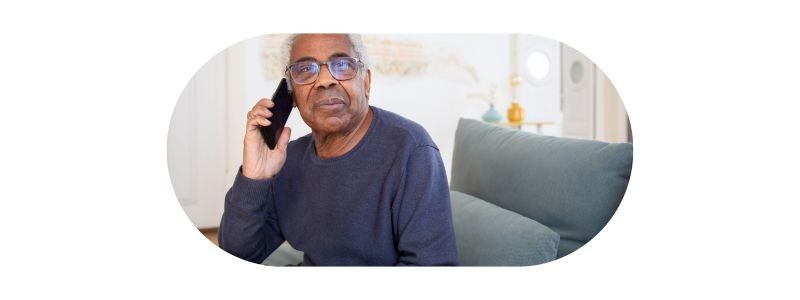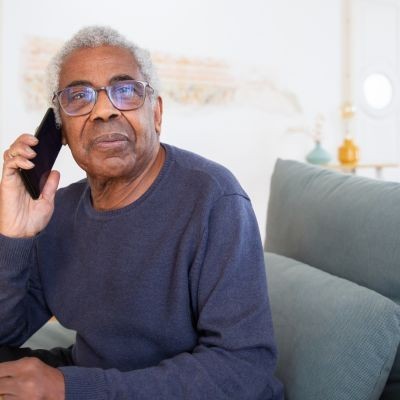
Head of Online Medical Content

Audiology Expert at Hearing Aid UK

I Find It Difficult to Hear on the Phone. Do I Have Hearing Loss?
Learn how to recognise the signs of hearing loss and what to do about it
Struggling to hear on the phone?
Have you ever found yourself straining to hear someone on the other end of the line during a phone call? Perhaps you’ve had to repeatedly ask them to speak up or have even missed parts of the conversation entirely. If this sounds familiar, you might be wondering whether this difficulty is a sign of hearing loss.
In this article, we'll explore whether the challenges you're experiencing could be related to hearing loss, what causes these issues, and what steps you can take if you’re concerned about your hearing.
Why is it hard to hear on the phone?
First off, it's important to understand why phone calls can sometimes be difficult to hear. Unlike face-to-face conversations, phone calls lack non-verbal cues like facial expressions and body language. This can make it harder to fill in the gaps when speech isn’t entirely clear. The quality of the call itself also plays a significant role.
Poor signal, background noise, or a low-quality connection can all impact how well you hear the person on the other end. However, if you find that this difficulty is not just occasional or related to any externals, it may be time to consider whether there could be an underlying issue with your hearing.
What are the signs of hearing loss?
Hearing loss often develops gradually, and it can be hard to notice until it starts affecting your day-to-day activities. The following signs could suggest that hearing loss might be present:
- Difficulty understanding speech: If you find it hard to follow conversations on the phone, especially when there’s background noise, it may indicate that your hearing is no longer as sharp as it once was. This can become more noticeable when there are multiple people talking at once or when the speaker has a soft or unclear voice.
- Asking people to repeat themselves: If you’re constantly asking others to repeat themselves during phone calls, or even in face-to-face conversations, it might suggest that you’re struggling to catch certain sounds or words.
- Muffled or distorted sound: When listening to phone conversations, if the voice sounds muffled or distorted, it could indicate a problem with the clarity of your hearing. This is usually a sign of high-frequency hearing loss, which affects your ability to hear higher-pitched sounds.
- Increasing volume: If you find yourself turning the volume up on your phone or asking others to speak louder than usual, it may indicate that your hearing sensitivity has decreased over time.
- Difficulty in noisy environments: Many people with hearing loss find it more difficult to hear in noisy environments, such as in a cafe, on the bus, or even in a busy office. If you’ve noticed that it’s harder to hear over the phone in these situations, it could point to hearing issues.
What causes hearing loss?
There are several potential causes for hearing loss, some of which are more common as we age, while others can be due to lifestyle factors, injury, or health conditions. Here are some of the most common causes:
- Age-related hearing loss (Presbycusis): As people age, the structures in the inner ear can deteriorate, leading to gradual hearing loss. This typically affects the high frequencies first, which may make it harder to hear consonants and certain speech sounds, especially on the phone.
- Noise-induced hearing loss: Exposure to loud noises over time, whether through work, hobbies, or simply listening to music at high volumes on headphones, can damage the sensitive hair cells in the inner ear, leading to permanent hearing loss. This can impact both the clarity and volume of sound, making phone conversations more difficult.
- Ear infections or blockages: Sometimes, temporary hearing difficulties on the phone may be caused by an ear infection, fluid buildup, or wax blocking the ear canal. This can muffle sounds and make it harder to hear clearly.
- Health conditions and medications: Certain health conditions, such as diabetes, high blood pressure, or heart disease, can affect hearing. Some medications, such as those used to treat cancer or infections, can cause hearing loss as a side effect.
What to do if you're worried about your hearing
If you find it increasingly difficult to hear during phone calls, there are steps you can take to address the issue:
- Get your hearing checked: The best way to determine whether you have hearing loss is to see a healthcare professional or audiologist for a hearing test. They can assess the nature and degree of your hearing loss and provide recommendations for treatment.
- Review your space: If you’ve noticed your hearing is only affected in certain environments, take note of where and when the issues arise. This can help you pinpoint whether external factors, such as background noise or phone signal, are contributing to the problem.
- Improve the quality of your phone: Some phones offer settings that can improve the clarity of speech. You might want to try adjusting the volume, using a speakerphone, or investing in a specialised hearing aid-compatible phone. There are also apps designed to amplify sound or enhance clarity during calls.
- Protect your hearing: If you are concerned about future hearing loss, be mindful of the volume at which you listen to music or speak on the phone. Protecting your ears from excessive noise exposure can help slow down the progression of hearing loss.
- Consider hearing aids: If your hearing loss is diagnosed, hearing aids can significantly improve your ability to hear clearly, including on the phone. Modern hearing aids are highly sophisticated, offering features such as Bluetooth connectivity to allow direct audio streaming from your phone to the device.
Why Choose Us?
- FREE Hearing Tests
- Best Hearing Aids and Prices
- FREE Aftercare for Life
- FREE Home Visits
- 200+ Local Audiologists
- 60 Day Money Back Guarantee
I can't hear on the phone
Struggling to hear on the phone can be frustrating, but it doesn’t necessarily mean you have hearing loss. It’s important to consider the context, such as signal quality or background noise, before jumping to conclusions.
However, if you find that you’re regularly having trouble understanding phone conversations, it might be time to consider the possibility of hearing loss.
A hearing test can help clarify the issue, and early intervention can make a significant difference in managing and even improving your hearing health.
If hearing loss is detected, there are plenty of modern solutions to help you continue to engage with the world around you with clarity and ease
Other hearing loss awareness articles you might like...
 Straining to Hear Conversations – Do I Have Hearing Loss?
Straining to Hear Conversations – Do I Have Hearing Loss?  I have trouble hearing on the phone, do I have hearing loss?
I have trouble hearing on the phone, do I have hearing loss?  I Keep Turning Up the Volume on the TV – Do I Have Hearing Loss?
I Keep Turning Up the Volume on the TV – Do I Have Hearing Loss? Our specialist service includes:
Do not spend hundreds of pounds without getting a second opinion from us.
Please call us on 0800 567 7621
 Not only are the prices great, but the service is fantastic! Many thanks to your team.
Not only are the prices great, but the service is fantastic! Many thanks to your team.What's included in our hearing aid prices?
If you are looking at this page then it is likely that an audiologist has suggested that you purchase this particular hearing aid, so is this the best model for you?
In general, any audiologist will always recommend to you the model that best suits your needs. Here is a useful checklist to make sure that is the case.
- Audiologist level of knowledge: The audiologist you have seen will hopefully have a wide knowledge of all available hearing aids, however, some will only be familiar with a small number of brands and therefore may not really be in a position to know which model is the best for you. It is OK to challenge their recommendation and ask them to justify why this particular brand is the one for you.
- Do research: Read about the hearing aid that was recommended. Does it seem like it will suit your lifestyle? Does it have more or fewer features than you need?
- Be aware of sales targets: Many high street retailers have specific tie-ins to a particular manufacturer/brand. The hearing aid they have suggested may still be the correct one for you, but do your research so that you know why they might have recommended it.
If in doubt, feel free to give us a call. That's what we're here for. In the meantime, read all about our review of the best hearing aids for 2025 here
If you have significant hearing loss in both ears, you should be wearing two hearing aids. Here are the audiological reasons why:
Localisation: The brain decodes information from both ears and compares and contrasts them. By analysing the minuscule time delays as well as the difference in the loudness of each sound reaching the ears, the person is able to accurately locate a sound source. Simply put, if you have better hearing on one side than the other, you can't accurately tell what direction sounds are coming from.
Less amplification is required: A phenomenon known as “binaural summation” means that the hearing aids can be set at a lower and more natural volume setting than if you wore only one hearing aid.
Head shadow effect: High frequencies, the part of your hearing that gives clarity and meaning to speech sounds, cannot bend around your head. Only low frequencies can. Therefore if someone is talking on your unaided side you are likely to hear that they are speaking, but be unable to tell what they have said.
Noise reduction: The brain has its own built-in noise reduction which is only really effective when it is receiving information from both ears. If only one ear is aided, even with the best hearing aid in the world, it will be difficult for you to hear in background noise as your brain is trying to retain all of the sounds (including background noise) rather than filtering it out.
Sound quality: We are designed to hear in stereo. Only hearing from one side sounds a lot less natural to us.
Fancy some further reading on this topic? You can read about why two hearing aids are better than one in our article, hearing aids for both ears, here
For most people, the main benefit of a rechargeable hearing aid is simple convenience. We are used to plugging in our phones and other devices overnight for them to charge up. Here are some other pros and cons:
For anybody with poor dexterity or issues with their fingers, having a rechargeable aid makes a huge difference as normal hearing aid batteries are quite small and some people find them fiddly to change.
One downside is that if you forget to charge your hearing aid, then it is a problem that can't be instantly fixed. For most a 30-minute charge will get you at least two or three hours of hearing, but if you are the type of person who is likely to forget to plug them in regularly then you're probably better off with standard batteries.
Rechargeable aids are also a little bit bigger and are only available in Behind the Ear models.
Finally, just like with a mobile phone, the amount of charge you get on day one is not going to be the same as you get a few years down the line. Be sure to ask what the policy is with the manufacturer warranty when it comes to replacing the battery.
Looking for more information on rechargeable hearing aids? Read our dedicated page on the topic here
For most people, the answer is yes. But it's never that simple.
The majority of hearing problems affect the high frequencies a lot more than the low ones. Therefore open fitting hearing aids sound a lot more natural and ones that block your ears up can make your own voice sound like you are talking with your head in a bucket. Therefore in-ear aids tend to be less natural.
However the true answer is we can't tell until we have had a look in your ears to assess the size of your ear canal, and until we have tested your hearing to see which frequencies are being affected.
People with wider ear canals tend to have more flexibility, also there are open fitting modular CIC hearing aids now that do not block your ears.
There is also the age old rule to consider, that a hearing aid will not help you if it's sat in the drawer gathering dust. If the only hearing aid you would be happy wearing is one that people can't see, then that's what you should get.
Most people can adapt to any type of hearing aid, as long as they know what to expect. Have an honest conversation with your audiologist as to what your needs are.
Generally speaking, six or more. Unless it's none at all.
The number of channels a hearing aid has is often a simplistic way an audiologist will use to explain why one hearing aid is better than another, but channels are complex and it is really not that straightforward. Here are some reasons why:
Hearing aids amplify sounds of different frequencies by different amounts. Most people have lost more high frequencies than low and therefore need more amplification in the high frequencies. The range of sounds you hear are split into frequency bands or channels and the hearing aids are set to provide the right amount of hearing at each frequency level.
Less than six channels and this cannot be done with much accuracy, so six is the magic number. However, a six channel aid is typically very basic with few other features and is suitable only for hearing a single speaker in a quiet room. The number of channels is not what you should be looking at, it's more the rest of the technology that comes with them.
As a final note, different manufacturers have different approaches. One method is not necessarily better than any other. For example, some manufacturers have as many as 64 channels in their top aids. Most tend to have between 17 and 20. One manufacturer has no channels at all.
Hearing aids are easily lost, misplaced or damaged and typically are one of the most expensive personal possessions an individual can own. We offer hearing aid warranty coverage for £80 per year per aid. Find out more about this service we provide here
All our audiologists use the very latest technology and provide the full range of tests to accurately measure your hearing for free. Find out about what hearing healthcare services we offer all our customers here
Hearing Aid UK offers all their customers free home visiting services, even in a care home environment, for no extra cost. Including hearing tests, fittings, maintenance, check-ups and much more in the comfort of your own home and at your convenience. Find out more information about our home visits here
Here, at Hearing Aid UK, we are dedicated to offering low hearing aid prices. We achieve this by having no head office and low marketing costs. Our hearing aid prices are amongst the lowest you will find anywhere in the world. Explore our prices, brands, and models here
Ask the Experts
6 Morton Lane
Walkwood
Redditch
Worcestershire
B97 5QA
Latest Launch
When we refer to a product as 'Latest Launch', we mean it is the latest to be released on the market.
New
When we refer to a product as 'New', we mean that the product is the newest hearing aid model on the market.
When we refer to a product as 'Superseded', we mean that there is a newer range available which replaces and improves on this product.
Older Model
When we refer to a product as an 'Older Model', we mean that it is has been superseded by at least two more recent hearing aid ranges.
